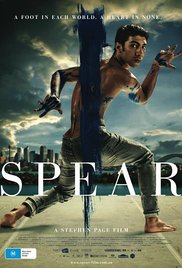
SPEAR
Australia, 2015, 83 minutes, Colour.
Hunter Page- Lochard, Aaron Pedersen.
Directed by Stephen Page.
One might call Spear a cinema event. It was screened at a number of festivals and then received some limited cinema release.
The reason for seeing this cinema event is that it presents the Bangarra Dance Company, celebrated in Australia for over 25 years, an indigenous company, performing promoting aboriginal art, dance, and exploration of ideas. Is also draws strongly on aboriginal history, before the white arrivals and settlement as well as the uneasy coexistence and hostility between black and white.
Stephen Page is the director of the company and the director of the film. His son, Hunter Page- Lochard, is the principal dancer. The full complement of dancers includes black dancers as well as white. There are also some acting roles, principally that of the Suicide Man, played by veteran actor Aaron Pedersen (Mystery Road, the Jack Irish series).
The film has striking visuals, cinema being able to provide an enormous range, and, with the editing, intercutting them with great effect. There are scenes from the city, dark alleyways, a tenpin bowling rink, escalators… Some of the film was made in Sydney, in studios on Cockatoo Island, but there is a great deal of location photography, especially in Arnhem Land, with its waterways, with its desert, foliage, and a pervading red.
The narrative the film concerns Djali, a young man on a journey, a quest for his identity in himself and as an aboriginal man. At the opening, there is a complex ritual, a kind of awakening for the young man, and the consecration. Ochre and paint are frequently placed on him and on other characters, indication of the tradition of the corroboree. As he goes on his journey, he walks through the city, and encounters the Suicide Man and his alcoholic haze, his wry comments, his anger at people passing by. Later, there will be an Old Man, a kind of guide, who eventually hangs himself. Others are described as Alcoholic Man, Androgynous Man, Abused Man, Big Man, Prison Man.
While the film has an immediate impact for an indigenous audience, there are various moments when a white audience will be challenged, invited to reflect, invited to appreciate – and a comically ironic episode featuring the very popular (if now seen as fairly racist) song, My Boomerang Won’t Come Back!
Djali moves through the city and then out into the deserts, encountering a range of characters including an Old Lady, Earth Spirit, Woman of Desire, sometimes presented like icons against the desert background, as are some of the tribal men, covered in white, and standing in the desert.
Accompanying the young man on his journey are a number of dancers, enabling the audience to appreciate the virtuosity and talent of the dance group. While there are some female presences, Spear is predominantly a film about males. At various times there are also white dancers and white actors involved in interactions, both in harmony and in disharmony, struggle and fight.
The event builds to a climax, the achievement of the young man, his coming into his own – although, as one of the few lines of dialogue mentions, he has a foot in each world but his heart is in none.